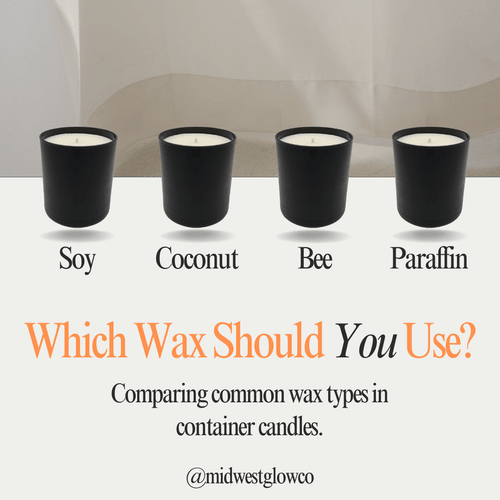
Choosing the Right Candle Wax: A Comparison of Popular Wax Types
When you're shopping for the perfect candle, it's easy to focus on the fragrance — but have you ever wondered what your candle is actually made of? The type of wax plays a huge role in how a candle performs, how cleanly it burns, and how safe it is for your space.
From soy to beeswax, paraffin, and coconut wax, each has its own pros, cons, and ideal use. In this guide, we’re breaking down the most common types of candle wax so you can make a choice that aligns with your home, values, and lifestyle.
Why Wax Type Matters
Candle wax affects:
-
Burn time
-
Soot and smoke output
-
Scent throw
-
Environmental impact
-
Price
Understanding the differences helps you choose a candle that’s better for your health, your home, and the planet.
1. Soy Wax
Best for: Clean, everyday candles with strong scent throw
Soy wax is a natural, renewable wax made from soybean oil. It's one of the most popular alternatives to paraffin and is a favorite in clean candle brands (including us at Midwest Glow).
Pros:
-
Clean burning with minimal soot
-
Excellent for holding and releasing fragrance
-
Affordable and widely available
-
Vegan and biodegradable
Cons:
-
Can frost or crack in appearance
-
Slightly softer than other waxes, which can impact durability in high heat
Midwest Glow uses 100% soy wax for a clean, safe burn with excellent scent performance.
2. Beeswax
Best for: All-natural, unscented, or luxury minimalist candles
Beeswax is produced by honeybees and has been used in candles for centuries. It burns beautifully without any additives and even helps purify the air.
Pros:
-
Naturally sweet, honey-like scent
-
Very slow-burning
-
Little to no smoke
-
Naturally cleans the air by releasing negative ions
Cons:
-
More expensive
-
Not vegan
-
Less effective at throwing added fragrance
3. Paraffin Wax
Best for: Bold, heavily scented candles on a budget
Paraffin wax is a petroleum byproduct and has long been used in commercial candles. It’s inexpensive and has a strong scent throw — but it comes with concerns around health and sustainability.
Pros:
-
Strong scent throw
-
Very affordable
-
Versatile and easy to work with
Cons:
-
Derived from fossil fuels
-
Produces soot and potentially toxic byproducts when burned
-
Non-renewable and non-biodegradable
4. Coconut Wax
Best for: Luxe, sustainable candles with a creamy burn
Coconut wax is made from the cold-pressed oil of coconut meat. It’s a rising star in the candle world for its clean burn, excellent scent throw, and eco-friendly profile.
Pros:
-
Ultra-clean, slow burn
-
Great scent throw
-
Natural and sustainable
-
Minimal soot
Cons:
-
More expensive
-
Often blended with other waxes for stability
-
Less common, which can drive up cost
At a Glance: Wax Comparison Chart
| Wax Type | Burn Time | Scent Throw | Sustainability | Smoke/Soot | Price |
|---|---|---|---|---|---|
| Soy | Long | Strong | High (vegan) | Very low | $$ |
| Beeswax | Longest | Light/Natural | Medium (not vegan) | Very low | $$$ |
| Paraffin | Moderate | Very strong | Low | High | $ |
| Coconut | Long | Strong | High (vegan) | Very low | $$$ |
Bonus: What About Wax Blends?
Many candle makers (especially luxury or boutique brands) blend waxes to combine the best qualities of each.
For example:
-
Coconut-soy blends (often called "coco-soy") offer excellent scent throw and burn time with a smooth finish
-
Beeswax-paraffin blends can balance cost with performance
-
Some use soy-paraffin blends to maintain affordability while reducing soot
At Midwest Glow, we prefer to stick with 100% soy wax — no blends or additives — because it gives our customers the cleanest, safest burn with the rich scent experience we’re known for. We also use a blended Coconut, Soy, and Sunflower Wax to make our new Wax Melts. This blend can hold a surprisingly HIGH fragrance load!
Final Thoughts
There’s no “one best” wax — the right choice depends on what matters most to you. Whether you’re drawn to eco-friendly options, strong fragrance, or a minimalist aesthetic, understanding the differences in candle wax types helps you buy with confidence.
Want to Try a Clean-Burning Soy Candle?
We’ve crafted every Midwest Glow candle with 100% soy wax and phthalate-free fragrance for a burn you can feel good about.
Want more candle education + scent tips? Check out the rest of The Glow Guide.
Happy Burning!









